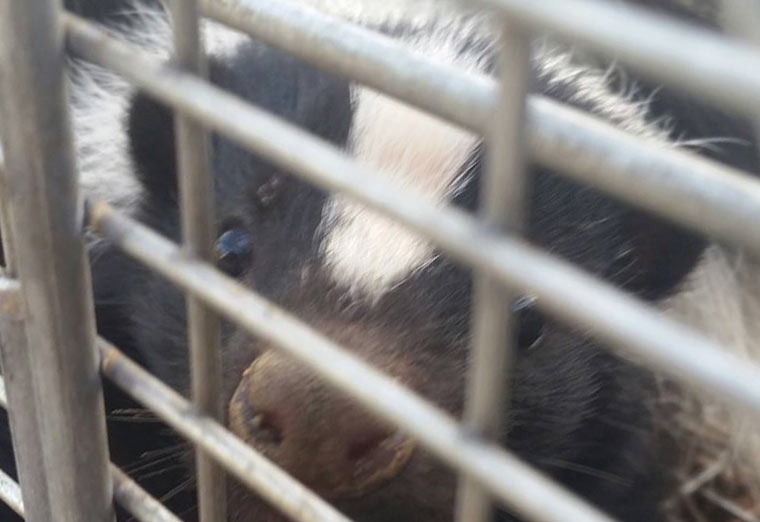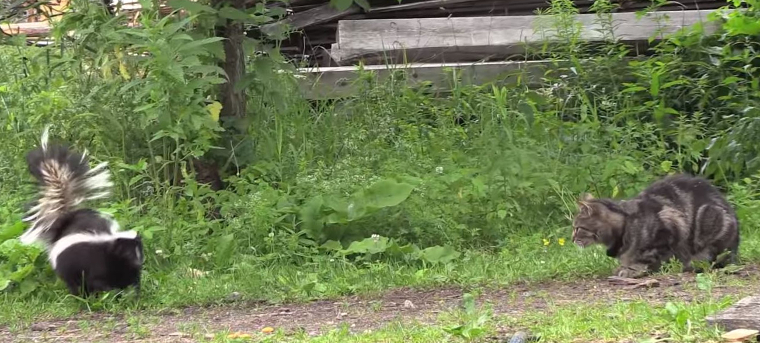-
info@aaanimalcontrol.com
Call us for help in your town
Humane Wildlife Education
Are skunks dangerous to cats, dogs, or other pets?
Need skunk removal in your hometown? We service over 500 USA locations! Click here to hire us in your town and check prices - updated for year 2020.
All wild animals are dangerous to your pets, and this is even more so the case if you have not made sure your pets are vaccinated against common diseases they would encounter in the wild. It takes just one moment for your pet to become infected with something that has the potential to change its life, and not in a good way. One bite from a rabies-infected raccoon, or drinking from a water bowl that a rat has left salmonellosis bacteria behind in.

Skunks are very dangerous to pets, and that's because they don’t seem that dangerous at all. Your cat or dog will happily sniff around the skunk, and things may even be quite friendly at first, but one paw out of line and the skunk will turn right around and spray. Skunk spray is not just very smelly, but also not very nice to your animals. There’s a reason it smells so bad. It's a very big warning to any predator or attacking creature that it should back away … and fast!
What comes out of the skunk is a mixture of alcohol and sulphur, and it’s a toxic mix. It smells bad, and it's not very friendly if it gets anywhere near your face. It can induce vomiting and nausea, burns a bit, and if it gets in the eye, can even cause blindness, although this is generally temporary.
The skunk spray is actually very dangerous to your pet, and if it gets into your eyes, mouth or nose, could make your pet very sick. You will need to call on a vet if your pet gets sprayed by a skunk, and then you’ll have the arduous task of getting rid of that vile smell.
Moving along from one defense mechanism, to another, and the skunk has an impressive set of claws and teeth that you definitely won't want to get too close to your beloved family pets. Wounds inflicted by wild animals, particularly skunks, can be very deep, may require stitches, will definitely need cleaning, and may even need treatments, such as antibiotics ointments or medications, to ensure no infection occurs. Some pets may even need shots, and this is definitely the case if your pet hasn't already been vaccinated against the rabies virus.
Skunks are one of the most prolific carriers and transmitters of the rabies virus, and this is a very dangerous disease that will cause death if not treated. It is also highly contagious, and is passed from animal to animal, and even from animal to human and human to human, via infected saliva. Bites are the biggest culprits, but if claws have been recently licked and saliva is still present, even a quick swipe from an infected animal could be enough to pass the disease along.
Skunks actually have a great number of diseases associated with it, for an animal that looks so cute, and is portrayed so cute in films such as Disney’s Bambi. These include:
Tularemia
Q-fever
Canine distemper
Canine hepatitis
Leptospirosis
Listeriosis
Because of the dangers associated with skunks, particularly the rabies virus, you will find that certain wildlife control experts will offer free services when skunks enter residential properties. It is not advisable that you get too close to this animal, or any other wild animal, and you will most definitely want to keep the creature away from your household pets.
Are skunks dangerous to cats, dogs and other pets? Yes, very much so. Take great care to ensure the two never come together.
Do skunks attack pets?
Need skunk removal in your hometown? We service over 500 USA locations! Click here to hire us in your town and check prices- updated for year 2020.
It is not unusual to hear of skunks attacking smaller cats and dogs, but it is quite rare. Most cats and dogs are actually larger in size than the average skunk, although puppies and kittens will be vulnerable if left unattended outside. Skunks might not pose the biggest problem, but there are larger wild critters that will attack household pets if they feel they can win the battle.

Skunks are actually quite shy creatures. They have the awful skunk spray reflex, but they will only use that when they feel it is absolutely necessary. Just like snake venom, there is a store or reserve of the skunk spray and when it has run out, such as with multiple, successive squirts in a short period of time, the animal must wait for the store to refresh itself, as such.
The skunk would much rather use the run-away or spray reflexes before they use the fight-it-out approach. Against a larger animal, the skunk won't stand too much of a chance. It has sharp teeth and claws but, even still, it's not the animal that's well known for it's massively aggressive temperament. The majority of skunk-pet conflicts arise when a curious cat or defiant goes sniffing around and gets a little too close for comfort. The skunk WILL spray if it is startled, and a dog coming right up behind you is a pretty startling affair.
Conflicts can occasionally happen over food. If you have left food out in the back yard or on the back porch for your dog or cat and the skunk comes across it first, the two animals may fight it out over the food. Skunks are scavengers, often eating food that has been left by other animals. Eating your pets' food is no different from stealing the carcass from another wild scavenger. When the dog or cat realizes what's happening — that the skunk is stealing the food that is being left out for it — it will not be happy. It will snap and make a lot of noise to try and encourage the skunk away, and a particularly overzealous dog or cat may just get a little bit too close. The skunk's first reflex will be to spray in most cases, but if they don't have this opportunity, an attack could happen.
As a general rule, skunks will not go out of their way to attack a household pet, although the same can't be said for other, larger wild creatures. It is wise to keep your pets inside overnight to prevent domesticated pet-wild animal conflicts.
For more information, you may want to click on one of these guides that I wrote:
How much does skunk removal cost? - get the lowdown on prices.
How to get rid of skunks - my main skunk removal info guide.


















